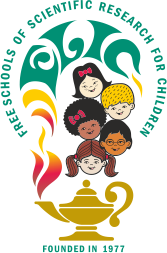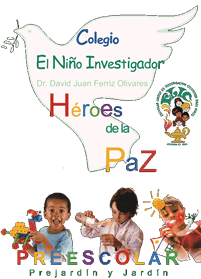Our Foundation

The ELIC Foundation, Free Schools of Scientific Research for Children, is an international non-profit Institution with its world headquarters located in Caracas, Venezuela. It was founded in 1977 by Dr. David Juan Ferriz Olivares and Acct. Maria Nilda Cerf Arbulu in Caracas, Venezuela and since 1991 has been recognized as a private Foundation in various American and European countries.

The ELIC Foundation, Free Schools of Scientific Research for Children, is an international non-profit Institution with its world headquarters located in Caracas, Venezuela. It was founded in 1977 by Dr. David Juan Ferriz Olivares and Acct. Maria Nilda Cerf Arbulu in Caracas, Venezuela and since 1991 has been recognized as a private Foundation in various American and European countries.
The ELIC Foundation fosters within children critical analysis within research. This is under the high ideals proposed by Dr. Serge Raynaud de la Ferrière, “What is important is not solely teaching something to a child; it is shaping their spirit for observation and reflection, critical analysis within research and the love for truth,” with the objective of awakening within them an understanding through KNOWING, in order to apply this to their small RESEARCH, resulting in children having a more profound, creative, social, scientific, epistemological and andragogic attitudes. The general framework of the ELIC Foundation is set up for the child to develop their potentials, providing them with all of the necessary tools to grow in harmony with themselves and society.
The great educator Heinrich Pestalozzi discusses that “true education, education according to nature, in its essence, strives to aspire to perfection, to tend to the realization of human faculties…” and the ELIC Foundation, with its vanguard spirit in accordance with the imperatives of the New Era of Synthesis and knowledge, opens the field of scientific research for children to expand their level of understanding so that this may serve them and so that it can be projected to every extent of life. As Dr. Serge Raynaud de la Ferrière says, “Life, understood in its most profound sense, is a dominion of precious research that should be appreciated in its most just value: the things that are termed sacred are precisely those that have been endowed with more life” (Yug Yoga Yoghismo, p. 503, Diana Ed. , Mexico, 1969)
In reality the researcher is at a more elevated level than the professional whom practices without researching. More so, there can exist an abyss between the researcher who searches within an unknown field and the professional who only applies what others have already researched, verified and elaborated upon. Hence the investigator represents the highest level. They usually exceed the general opinion, with concepts that stand out from the standards in that specialty. The researcher is an observer par excellence, as is the child. Children demonstrate the capacity to absorb, as Maria Montessori says, the giant world of adults; and even more so, to isolate themselves in their own world, creating their own childlike fantasies and imaginations. A child is capable of learning a language, being one of the most complicated structures in adulthood, in less time than an adult. Dr. David Juan Ferriz Olivares says, “If both great observers come together, there is a world that is established between the two: the wonder of what one teaches and of what the other learns.”
A great deal of the activities developed by the ELIC has been thanks to the contributions of its Founders, Dr. David Juan Ferriz Olivares and Accountant María Nilda Cerf Arbulú, with the participation of their internationally prominent professional members. Another source of activities is the affinity and receptivity that our Foundation has with UNESCO’s activities, matters and subjects. The activities of the ELIC encompass to a great extent, the domain of earth science, which includes for example: the observation and care for terrariums, herbariums and aquariums; exchanges of ideas with Centers of Scientific Research, factories, farms, newspapers and other places that represent scientific interests; the fostering of creativity that leads to the installations of Science museums, Scientific Libraries, Science-related Information boards and an audio newspaper.
Dr. David Juan Ferriz Olivares officially inaugurated “The Children’s Press” in 1978 where it was the children whom would write the newspaper and take turns presenting their work to their classmates, establishing a dialog between them about what points should be published and what points where not constructive for the mental and physical wellbeing of the rest of the children. They counted on an advisor, which in this case was Dr. David Juan Ferriz Olivares, whom would guide them on which articles should be corrected and which methods or alternatives to follow, giving them a more constructive vision on what to do to avoid repeating certain situations amongst children. For example, one child tells his classmate that he didn’t do his homework because he was watching cartoons which also happened to be violent. The children were then asked for their opinion of this news. Here, Dr. David Ferriz Olivares would enter and guide the children in order to write the article. Other topics touched in the “Children’s Press” where for example, how make use of your free time, which included a list of movies that encouraged them in their homework and culture. This would be published in the entertainment page. The children also gave their opinions on the situations in their schools, the didactic materials being used, the time used to study and complete their homework, their parents’ participation, etc.
It must be noted that our concept of Science is, as Dr. Serge Raynaud del la Ferrière says, “in the unlimited sense of Knowing,” not limiting itself solely to the Natural Sciences, but also including the Humanities and Social Sciences, Epistemology and modern synthetic sciences like Ecology.
In fact, Bruner says, “To instruct someone in disciplines, is not the same as guiding them to store in their mind everything surrounding them. Rather, it is to teach them to participate in processes that allow the establishment of knowledge,” revealing an epistemological point of view. Many modern educational projects like the Cosmology Foundation, created in 1995 by the eminent neurophysiologist Dr. Rodolfo Llinás, as well emphasize that education should acquire a more epistemological nature. In his presentation about the Cosmology Foundation titled, “Cosmology as an approach to general understanding”, Dr. Llinás shows that “What can and should be given to the individual is an intellectual methodology so that any knowledge can be situated in an intellectual framework, in a determined geometric place of knowledge. Such a locus will define the contextual tenor of such knowledge and its relationship with other knowledge. Basically, what is being considered is the semantics of knowledge, in other words, a framework for understanding.”
We teach a subject not to obtain small mobile libraries, but to allow for the student to think like a mathematician, to assess topics like historiographers, to take part in the process of increasing knowledge. Knowledge is a process, not a product. What has been one of the primordial factors of scientific progress in the past few years? These advances have succeeded greatly because knowledge began to base itself in unifying ideas. These ideas group together in unifying projects, which give us a series of advantages, for example: to be able to grasp a greater number of concepts, a more unified vision of the world, greater ease in assimilating new concepts, a better understanding of the world of things, avoiding unnecessary repetitions… etc. We base ourselves on what Dr. Serge Raynaud de la Ferrière expressed in his message on the Family Unit in 1948: “Let us shape spirits that are capable of synthesis […] extensive, strong, capable of understanding a system in its entirety, and this possibility greatly depends on character development during childhood.”
Within the scope of the ELIC Foundation, a series of programs have been elaborated that do not have the characteristics of being heavily detailed and extensive. The topics however are neither disjointed nor clustered, but all the opposite, they are coordinated in a way to emphasize methods with which knowledge is elaborated.
But this is the basis of an even greater task as Dr. Serge Raynaud de la Ferrière also asks for a love for truth in order to shape children and for this we turn to one of the fathers of modern epistemology in order to have greater consciousness of this, Gastón Bachelard. He tells us that “left then is the most challenging task: to put scientific culture in a state of permanent mobilization, to replace closed and static knowing with an open and dynamic knowledge, to dialect all experimental variables, to finally reason the motives to evolve”. This is truly indeed what must be done; we must give reasons motives to evolve, which has been one of the bases of organizing the World Conferences for Childhood Talent of the ELIC Foundation (Free Schools of Scientific Investigation for Children). We invite you to look through our website to know more about our conferences, being in agreement with UNESCO’s proposal of learning to be, one of the four pillars of education proposed by the International Commission of Education for the 21st Century, in their report: “Education Contains a Treasure”.
But this is the basis of an even greater task as Dr. Serge Raynaud de la Ferrière also asks for a love for truth in order to shape children and for this we turn to one of the fathers of modern epistemology in order to have greater consciousness of this, Gastón Bachelard. He tells us that “left then is the most challenging task: to put scientific culture in a state of permanent mobilization, to replace closed and static knowing with an open and dynamic knowledge, to dialect all experimental variables, to finally reason the motives to evolve”. This is truly indeed what must be done; we must give reasons motives to evolve, which has been one of the bases of organizing the World Conferences for Childhood Talent of the ELIC Foundation (Free Schools of Scientific Investigation for Children). We invite you to look through our website to know more about our conferences, being in agreement with UNESCO’s proposal of learning to be, one of the four pillars of education proposed by the International Commission of Education for the 21st Century, in their report: “Education Contains a Treasure”.
We will finish this brief presentation with a call and an extended invitation to all by Dr. David Juan Ferriz Olivares in the opening of the ELIC Foundation: “It becomes necessary that professors, doctors, psychologists, physicists, mathematicians, artists, writers, professionals in general, form part of the great formative crusade for children and youth in this new era of true research, where we need true men and women, researching spirits not flooded with the critical deformation of the 20th century, but instead, open spirits that can understand systems in their entirety with accurate creativity, with greatness and social virtues that take science and philosophy to the pinnacle of human realization within the outlines of the great principles of Tolerance, Truth and Peace”.







